No hot water can be a frustrating problem, especially in the UK, where reliable heating and hot water are essential for staying comfortable. Whether it’s a chilly morning or a long day, we all count on a warm shower or a functioning heating system to keep our homes cozy. However, even the most reliable boilers, like the Vaillant EcoTec, can sometimes have issues that disrupt hot water flow. While these boilers are generally known for their efficiency and durability, occasional issues can arise, leaving homeowners unsure of what to do.
In this article, we’ll explore five common reasons your Vaillant EcoTec boiler might stop heating water and provide some straightforward troubleshooting tips. Some issues, like low pressure or a frozen condensate pipe, are easy to address on your own, while others might require a professional. By understanding these common problems, you can quickly determine if it’s something you can fix or if you need to call in an expert.
Taking the time to understand these issues can save you both time and money and help keep your boiler running smoothly all year. For those needing professional advice, check out this helpful guide on boiler maintenance tips.
Whether it’s a simple fix or a sign that it’s time for a service, knowing what might be wrong is the first step toward getting your boiler back to normal. Let’s dive in to learn what might be causing your Vaillant EcoTec boiler to stop heating water and how you can get it working again!
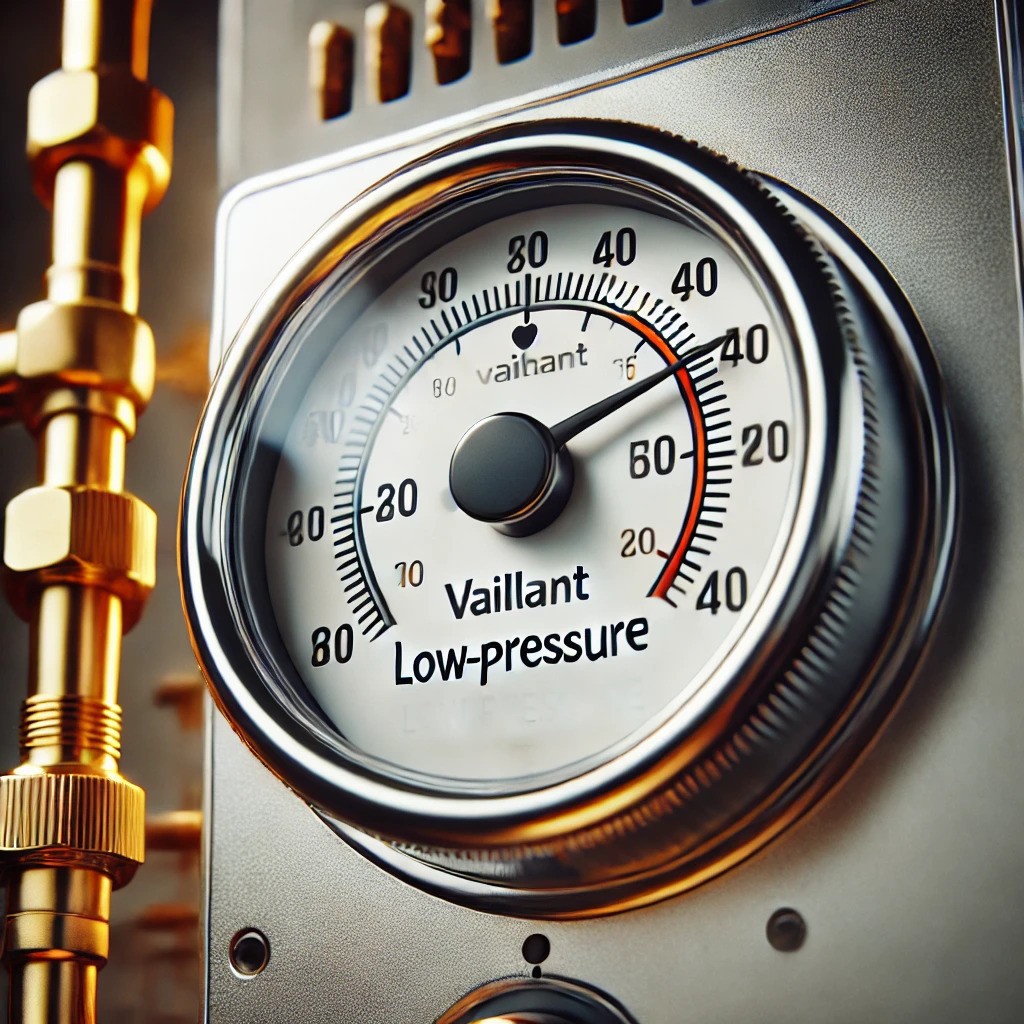
Low Boiler Pressure In Vaillant EcoTec
One of the most common reasons a Vaillant EcoTec boiler stops heating water is low boiler pressure. Low pressure can prevent your boiler from heating water properly, leading to fluctuating water temperatures or, in some cases, no hot water at all. It’s a common issue that’s usually easy to check and, in many cases, simple to fix.
Symptoms
When your boiler’s pressure is low, you might notice that the water doesn’t heat consistently or goes cold altogether. Low pressure means the boiler isn’t able to push heated water effectively through your system, affecting both the hot water and the central heating.
Cause
Boiler systems rely on a set level of pressure to work efficiently. If the pressure is too low, the boiler won’t be able to circulate water properly. This can happen for several reasons, like a small leak in the system, recent radiator bleeding, or just general wear and tear.
Fix
1. Check the Pressure Gauge:
The pressure gauge is usually on the front panel of your boiler. Ideally, it should read between 1 and 1.5 bars when the system is cold. If it’s below this range, your boiler pressure is too low.
2. Topping Up the Pressure:
To increase the pressure, you can add water by using the filling loop, typically a small lever or valve near the boiler’s pipes. Turn it until the gauge reaches the recommended range.
3. When to Call a Professional:
- If the pressure keeps dropping even after topping it up, it could indicate a more serious issue, like a leak. In this case, contact a professional. For more guidance, check this Vaillant pressure guide.
Keeping an eye on your boiler’s pressure and addressing any drops promptly can help prevent further issues and keep your system working well.
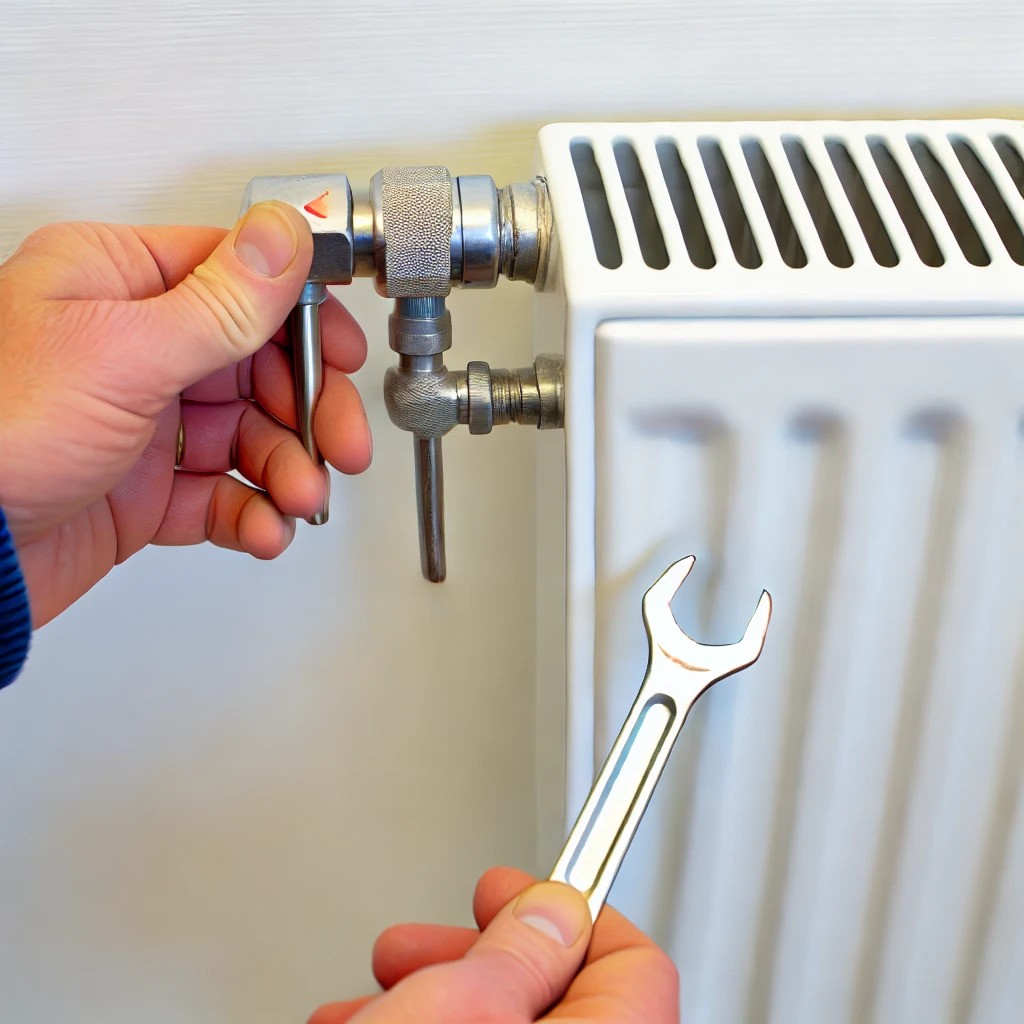
Thermostat Issues
Thermostat issues can also cause your Vaillant EcoTec boiler to stop heating water properly. If the boiler seems to be running, but no hot water is coming out, or if the water temperature doesn’t match the settings, it could be due to a problem with the thermostat.
Symptoms Of Thermostat Issues
A common sign of thermostat trouble is when your boiler runs as usual, but there’s no hot water, or the water temperature feels wrong. This can be frustrating because the boiler appears to be working, but the temperature is off.
Cause Of Thermostat Issues
A thermostat is responsible for regulating the temperature of your hot water and heating. If the thermostat is faulty or set incorrectly, it may prevent the boiler from reaching the right temperature. This could be due to an old or broken thermostat or simply because the settings have accidentally changed.
Fix
1. Check Thermostat Settings:
Make sure the thermostat is set to your desired temperature. Sometimes, the settings can be accidentally changed, especially on digital thermostats. Verify that the settings are correct.
2. Test the Thermostat’s Responsiveness:
To see if the thermostat is responsive, try increasing the temperature setting slightly. Listen for a clicking sound, which usually means it’s sending a signal to the boiler. If there’s no response, the thermostat may be faulty.
3. When to Replace the Thermostat:
If you’ve checked the settings and tested it without improvement, it might be time for a replacement. A faulty thermostat can cause ongoing issues and waste energy. Consider calling a technician for help choosing and installing a new thermostat.
If you need more detailed guidance, you can find useful tips in this thermostat troubleshooting guide. Taking care of thermostat issues early can help maintain consistent hot water and prevent further problems with your boiler.
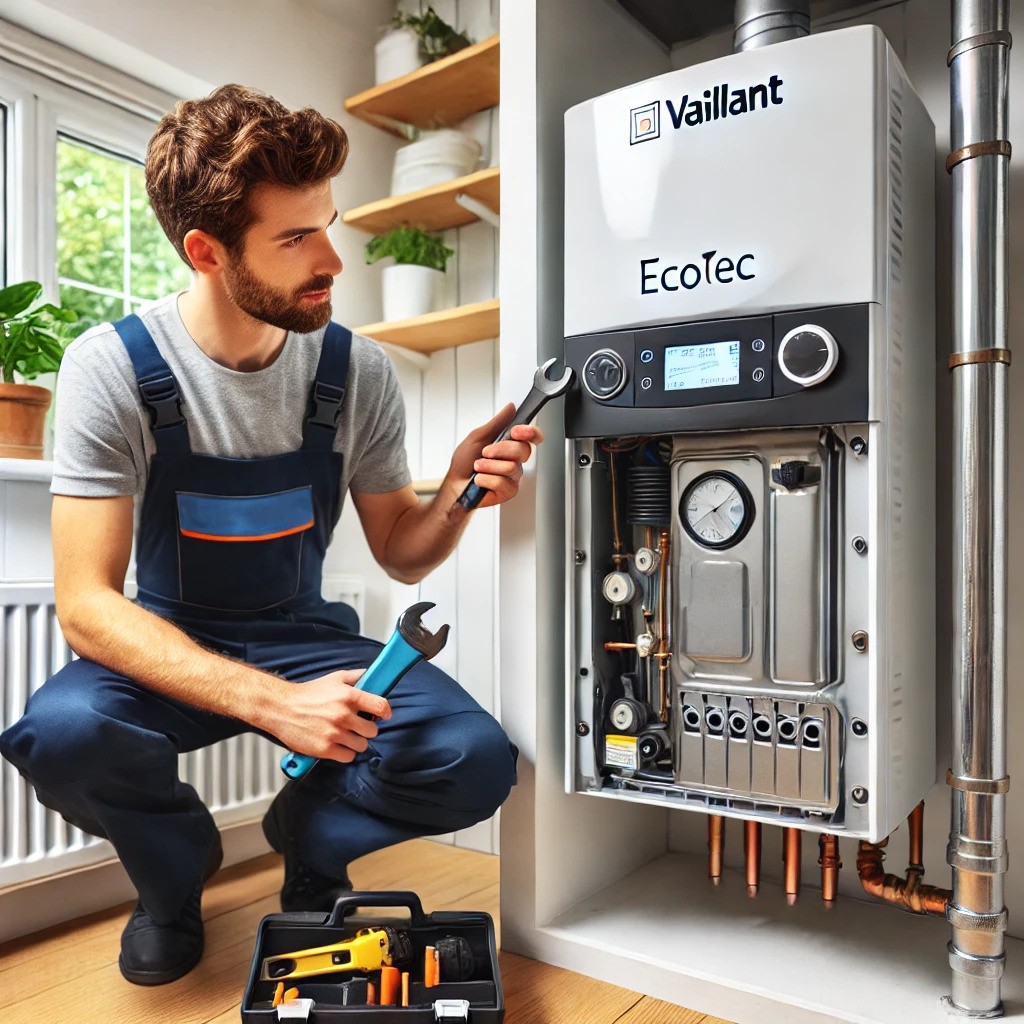
Faulty Diverter Valve
A faulty diverter valve is another common reason why your Vaillant EcoTec boiler may heat your home but not produce hot water for your taps. The diverter valve plays a key role in directing hot water to either your radiators or your taps, depending on what you need at the time.
Symptoms Faulty Diverter Valve
If your central heating is working fine, but no hot water is coming from the taps, it’s likely an issue with the diverter valve. This problem usually means that while the boiler can heat water for the radiators, it can’t send hot water to the taps, which is why they stay cold.
Cause Faulty Diverter Valve
The diverter valve is responsible for “diverting” hot water either to your taps or your radiators. When you turn on the tap, the valve should switch to allow hot water to flow to it. If the valve gets stuck or becomes faulty, it may not open or close correctly, meaning hot water only reaches the radiators and not the taps.
Fix Faulty Diverter Valve
1. Checking the Valve:
In some cases, the diverter valve may be accessible, and you might be able to see if it’s moving or stuck. However, this can be tricky to diagnose on your own, as the valve is often inside the boiler.
2. Professional Repair or Replacement:
Diverter valves are complex and usually require technical expertise to repair or replace. If you suspect an issue with this valve, it’s best to call a qualified engineer. They can inspect, repair, or replace the valve if necessary to restore your hot water.
For more information on diverter valve issues and professional support, visit this boiler repair guide. Addressing diverter valve issues early can prevent further boiler complications and ensure both your heating and hot water are running smoothly.
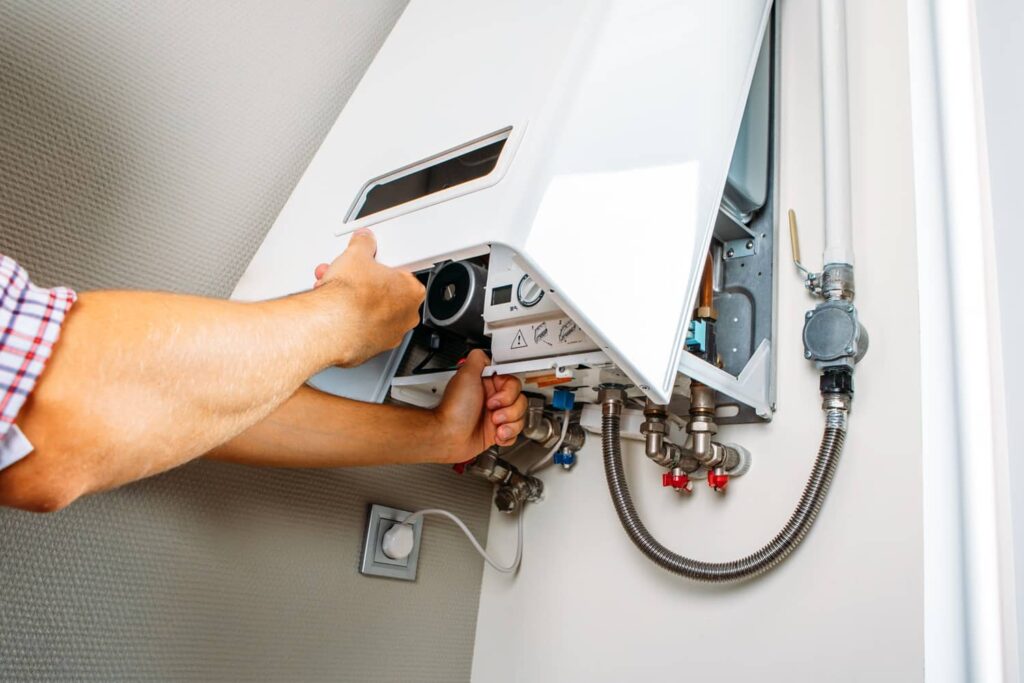
Air in the System
Air trapped in your heating system can cause various issues, from noisy pipes to inconsistent heating and low water temperature. If you notice any of these symptoms, it may mean that air pockets are blocking the flow of hot water, preventing it from circulating properly through your radiators and taps.
Symptoms to Check Air in the System
Signs of air in the system include gurgling or banging noises from pipes or radiators, uneven heating across radiators (hot in some areas, cool in others), and lower-than-expected water temperatures. These symptoms suggest that air is stopping the heated water from moving smoothly.
Cause For Air In The System
Air can enter the system in several ways, often due to routine boiler operation or minor leaks. Once inside, it creates pockets that disrupt the flow of hot water, making your system less effective and forcing your boiler to work harder to maintain temperatures. This can lead to increased energy bills and reduce the life of your boiler.
Fix
Bleeding the Radiators:
The most effective way to remove trapped air is to “bleed” the radiators. To do this:
- Turn off the heating and let the radiators cool.
- Use a radiator key to slowly open the valve at the top of each radiator.
- Listen for a hissing sound as air escapes, and close the valve once water starts to drip out.
Regular Maintenance:
- Bleeding radiators once or twice a year can help keep your system free of air and ensure even heating. Regular servicing of your boiler by a professional is also a good idea to keep everything running smoothly.
For a full guide on bleeding radiators and maintaining your system, visit this helpful radiator maintenance article. By keeping air out of your heating system, you’ll enjoy consistent warmth and prevent unnecessary wear on your boiler.
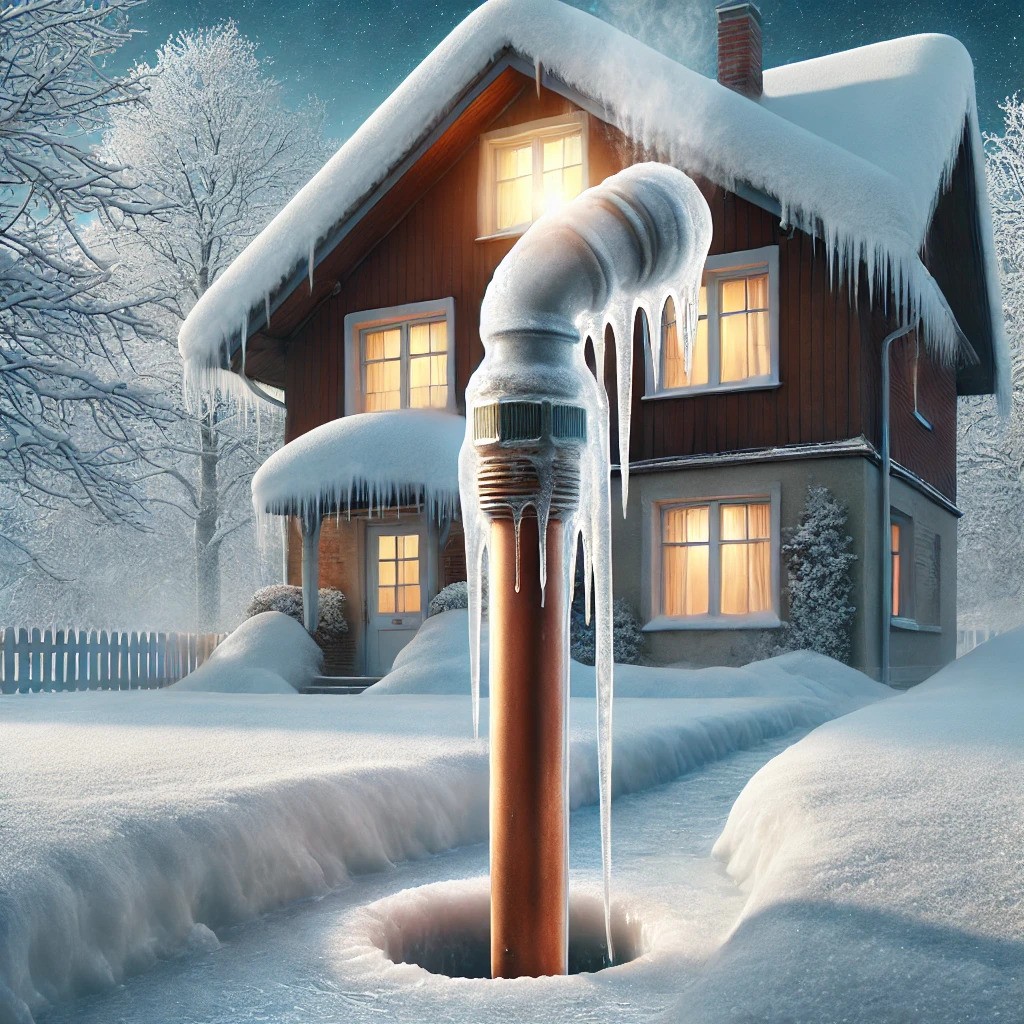
Frozen Condensate Pipe (Common in Winter)
A frozen condensate pipe is a common winter problem that can stop your Vaillant EcoTec boiler from producing hot water. This pipe carries waste water from the boiler to a drain outside, and in cold UK weather, it can freeze, causing a blockage and stopping the boiler from working properly.
Symptoms Of Frozen Condensate Pipe
If your boiler shows error codes or stops heating water during freezing weather, it might be due to a frozen condensate pipe. Other signs include unusual gurgling noises or complete shutdown of the boiler’s hot water function.
Cause Of Condensate Pipe
The condensate pipe runs from the boiler to the outside, where cold weather can cause the water inside to freeze. This creates a blockage that prevents waste water from flowing out, which can trigger safety measures that shut down the boiler to prevent damage.
Fix
Thawing the Pipe:
To safely thaw a frozen condensate pipe, follow these steps:
- Locate the pipe outside your home. It’s usually a white or grey plastic pipe.
- Pour warm (not boiling) water over the pipe to gently melt the ice inside. You can use a jug or a cloth soaked in warm water.
- Repeat as needed until the ice melts, and the pipe is clear.
Preventing Freezing:
To prevent this problem in the future:
- Insulate the pipe using foam insulation to help keep it warm.
- If possible, relocate the pipe indoors or to a more sheltered area to protect it from freezing temperatures.
For more guidance on managing a frozen condensate pipe, check out this condensate pipe thawing guide. Taking these precautions can save you from winter breakdowns and keep your boiler running smoothly through the colder months.
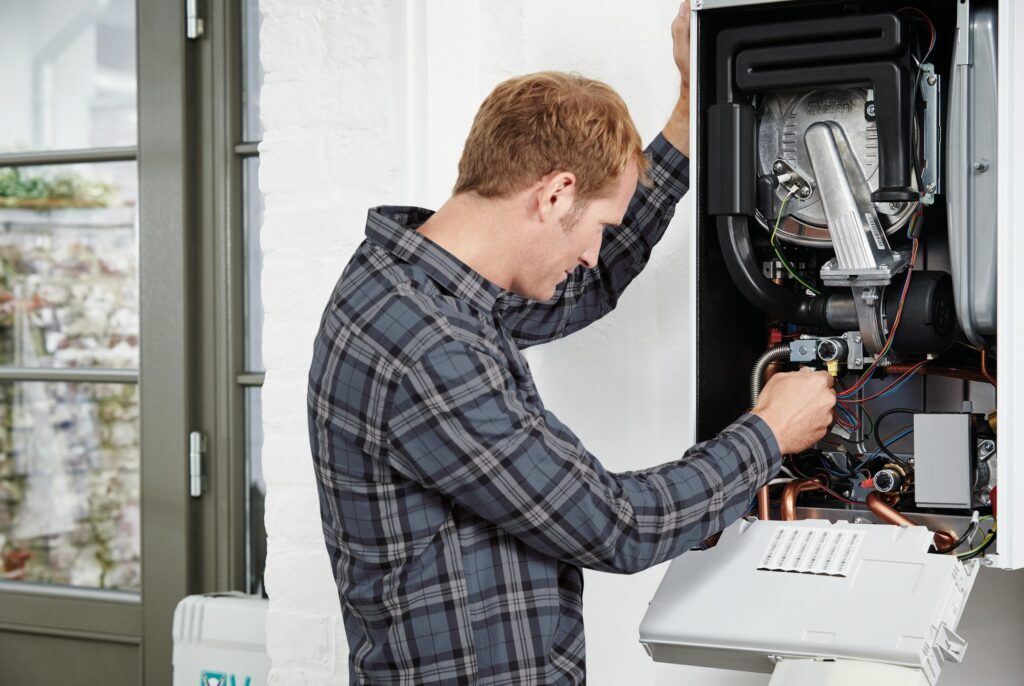
When to Call a Professional
Knowing when to call a professional is crucial to ensure your Vaillant EcoTec boiler remains safe and efficient. While DIY fixes can solve minor issues, some situations require expert help to prevent further complications or costly repairs. Here’s when it’s best to get a professional involved:
When DIY Fixes May Not Work
If you’ve tried troubleshooting common issues like low pressure or a frozen condensate pipe, but the problem keeps coming back, it’s time to call a technician. Persistent issues often indicate underlying problems, such as leaks or faulty components, that require advanced skills and tools to fix.
- Recurring Issues: If low pressure, thermostat issues, or diverter valve malfunctions happen frequently, a deeper inspection may be needed to find the root cause. Recurring issues can mean there’s a leak or a worn part that needs replacing.
- Complex Repairs: Certain parts of the boiler, like the diverter valve or heat exchanger, are complex and sensitive. Attempting to repair or replace them without proper knowledge can lead to more damage. A certified engineer has the expertise to handle these repairs safely.
- Persistent Error Codes: If your boiler shows error codes that don’t resolve with basic troubleshooting, a professional can diagnose the exact problem. Error codes can indicate anything from gas supply issues to electronic faults, which require technical knowledge to fix.
Benefits of Professional Maintenance
Regular maintenance by a qualified technician can extend your boiler’s life, improve efficiency, and prevent sudden breakdowns. Professionals can spot early signs of wear and fix minor issues before they become major problems. Annual servicing also helps keep your boiler in top condition, ensuring it runs safely and effectively all year round.
For a list of certified professionals, visit Gas Safe Register, which ensures you get qualified help for your boiler needs.

Conclusion
In conclusion, several common issues can cause your Vaillant EcoTec boiler to stop heating water. Low pressure, thermostat problems, a faulty diverter valve, air in the system, and a frozen condensate pipe are some of the main culprits. While some of these issues can be handled with basic troubleshooting, others require a professional touch to ensure a safe and effective repair.
Regular maintenance is essential to keep your boiler running smoothly and to prevent problems before they arise. Simple tasks, like checking the pressure and bleeding radiators, can make a big difference in your boiler’s performance. However, an annual service by a qualified technician can catch minor issues early and extend the life of your boiler.
If you’re experiencing persistent problems or need help with complex repairs, don’t hesitate to reach out to a trusted boiler technician. A professional can diagnose and fix issues accurately, saving you time, money, and potential hassle down the line. For reliable support, consider contacting a certified engineer through the Gas Safe Register. Taking care of your boiler ensures you’ll have reliable heating and hot water, no matter the season.
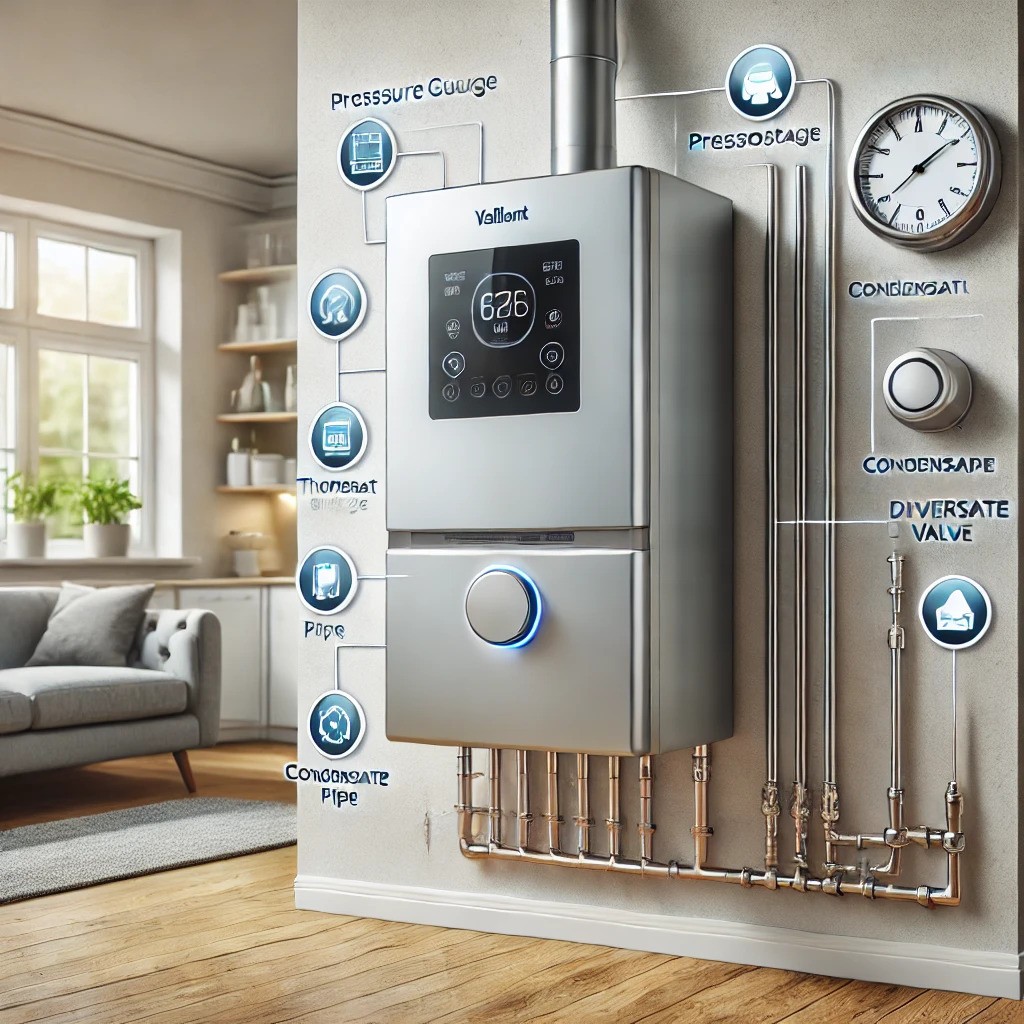


Pingback: Gas Boiler Installation Costs and What to Expect in the UK in 2025
Dealing with no hot water can indeed be a major inconvenience, especially in the UK where it’s essential for daily comfort. It’s good to know that some issues, like low pressure or a frozen condensate pipe, can be resolved without professional help. However, it’s also important to recognize when to call in an expert to avoid further complications. I appreciate the detailed explanation of common problems with the Vaillant EcoTec boiler, as it helps homeowners take the first step toward troubleshooting. How often should one check the boiler pressure to prevent such issues from occurring?
Living without hot water is indeed a nightmare, especially in the UK where the weather can be so unpredictable. It’s good to know that the Vaillant EcoTec is generally reliable, but it’s frustrating when it suddenly stops working. I’ve had issues with low boiler pressure before, and it’s such a simple fix, but it’s easy to overlook if you don’t know what to look for. The article does a great job of breaking down the common problems, but I wonder if there are any long-term maintenance tips to prevent these issues from happening in the first place. Do you think regular servicing is enough, or are there other steps homeowners should take? It’s always better to be proactive rather than dealing with cold showers unexpectedly!
No hot water is indeed a nightmare, especially during those freezing UK mornings! I’ve had my fair share of boiler issues, and it’s always a race against time to get it fixed. The Vaillant EcoTec is usually reliable, but even the best can have their off days. Low pressure seems to be a recurring theme—I’ve had to top mine up a few times, and it’s such a simple fix once you know how. But what about those times when it’s not just low pressure? How do you know when it’s time to call in a professional instead of trying to DIY it? I’d love to hear if anyone’s had a similar experience and how they handled it. Also, does anyone have tips for preventing these issues in the first place? Let’s share some wisdom!
Dealing with no hot water is indeed a hassle, especially in the UK where it’s a basic necessity. The Vaillant EcoTec is usually reliable, but it’s good to know what can go wrong and how to fix it. Low pressure seems like a common issue, but I’m curious—how often does this actually happen? The article mentions it’s easy to check and fix, but what if someone isn’t comfortable doing it themselves? Also, are there any long-term solutions to prevent low pressure from recurring? I’d love to hear from someone who’s dealt with this—what worked for you?
That’s a really helpful article, especially for those of us who rely on our boilers daily. I’ve had my Vaillant EcoTec for a few years now, and it’s been great, but I did experience a low-pressure issue last winter. It’s good to know that it’s something I can check and fix myself. I’m curious, though, how often should I be checking the pressure to avoid this issue? Also, are there any signs I should look out for before it becomes a bigger problem? I’d love to hear if anyone else has tips for maintaining their boiler’s efficiency. Do you think regular servicing is worth it, or is it better to wait until there’s an issue?
There’s a quiet elegance in the way you express your thoughts, each word chosen with such care and precision.